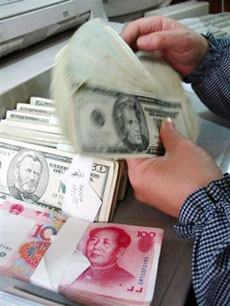Chinese encouraged to invest abroad
(chinadaily.com.cn/Reuters)
Updated: 2006-04-27 11:54 China is not expected to take any drastic action
to change its currency value, as the current yuan fluctuations, which are both
market-regulated and cautiously administered by the central bank, serves the
economy of China and the neighboring countries well, analysts said.

A bank clerk exchanges
Chinese yuan for an equivalent amount of U.S. dollars in a bank in
Liaocheng, east China's Shandong province in this February 28, 2006 photo.
[newsphoto] | Wu Xiaoling, a deputy governor of
the People's Bank of China, said recently that Beijing was doing its best and
that it would trust market forces to gradually let the currency move more
freely.
"There will be no wide fluctuation of foreign exchange rates, because it may
harm the steady development of Chinese economy," Wu said. "The yuan's
flexibility is increasing gradually and we will allow supply and demand to play
its role in forming the exchange rate."
And, China has noticed the negative impacts brought by its huge foreign
exchange reserves, at more than US$870 billion, and is taking steps to relieve
the pressure.
The State Administration of Foreign Exchange has started to
free up the country's foreign exchange regime with a shift from stockpiling
foreign exchange reserves in State coffers to letting businesses and individuals
hold more foreign currency. Some qualified commercial banks are also encouraged
to invest in overseas market.
The huge foreign exchange reserves, fuelled
by China's trade surplus and surging direct foreign investment, indeed
influenced China's economic growth, and limited the independence of the
country's currency policy, analysts have acknowledged.
Some forecast
that 15 or 20 years later, when China enters middle stage of aging society, with
an increased production cost and lower saving rate, China’s trade surplus may
then be reduced, and a balance of payments achieved.
Chinese President Hu
Jintao deflected U.S. pressures to allow the yuan to appreciate during last
week's visit to Washington, while saying China would gradually establish a more
flexible exchange rate system.
Qu Hongbin, chief China economist for the
HSBC, said China had already made a significant move on April 14 when it
announced plans to allow Chinese banks and institutions to invest private
capital overseas for the first time.
"This measure will lead to
fundamental changes by opening an official channel for foreign exchange outflows
and allowing Chinese retail investors and corporate sectors to invest in
overseas markets," Qu said. "We believe there is huge pent up demand for Chinese
savers to diversify their 31 trillion yuan (US$3.87 trillion) in accumulated
savings into foreign assets."
The move is designed to free the central
bank from having to purchase overseas government securities -- mostly US bonds
-- to offset growing foreign reserves that have piled up with China's huge
investment inflows and growing trade surpluses, he said.
|